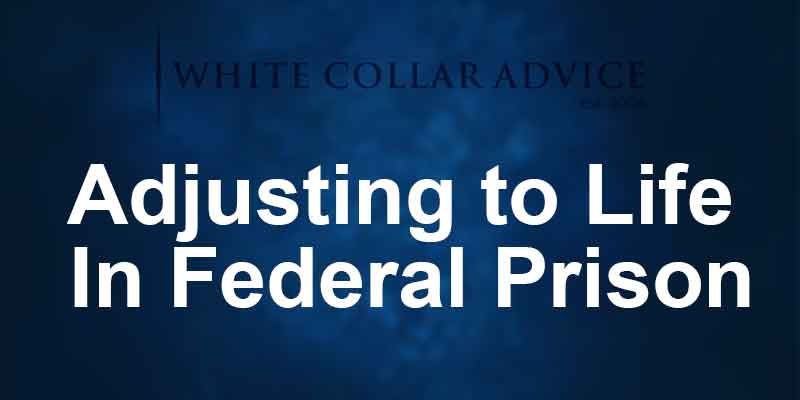Well, we have made it! Our final class in our Federal Prison Gone Bad series. For those of you who jumped in late, that is okay. I suggest hoping over to the blog at White Collar Advice to get any classes you missed.
By now we know that to thrive through imprisonment, prisoners must lead proactive adjustments. They begin serving their terms with the end in mind. With a clear vision of how they want to emerge, the successful prisoner takes action putting first things first. They strive to understand their environment before they try to impose their own needs on others. Finally, the successful prisoner also pursues activities, relationships, and adjustment patterns that lead to win/win outcomes.
That’s correct people, I am talking win/win! For some in prison, it’s difficult to contemplate such concepts. The prisoner without a plan feels alienated from his family and his community. When federal prisoners allow such feelings to overcome them, they sink inside the pestilence of confinement. To triumph over such negative adjustment patterns, successful prisoners pursue activities that add value to their life and to the lives of others.
Adjusting in ways that simply pass time do not make much sense. Those who have skills in higher education levels can easily find ways to make use of their time. Many people in federal prison struggle to pass their basic education courses.
One strategy I used to work through the inevitable days that seemed to dragged in prison was to tutor. I bonded with a few prisoners who needed help understanding fractions, calculating percentages and working through simple algebraic equations. The win/win from such encounters was obvious. The men I tutored developed the skills and eventually passed the GED. I derived a sense of meaning, as if I were making a useful contribution to advance another person’s life.
Contributing to the lives of others truly empowered me through my prison term. I may not have benefitted, or won in tangible ways. Yet through efforts I make to ease others through difficult and challenging times, I found myself feeling stronger, inoculating myself from the despairs that can accompany confinement.
Another example is the victory, or win, that came through my daily blog entries. By writing about my experiences and the lessons I learned from prison, I derived a sense of worthiness.
During some weeks in federal prison, I’ve received as many as 15 letters from readers of my blog. They wrote from various regions of the country, expressing gratitude for the efforts I’ve made to provide a window into the world of a productive prison adjustment.
How can you contribute to society, prove worthy of the love you receive, and prepare to come home ready, as I did? You must find a win/win.
By following the five principles I described in this class, I know that you will adjust successfully to prison. I adhered to this strategy for each of the days I served in prison. I highly suggest you follow suit.
I worked very hard to develop this class. I hope you found value in it.
Best,
Justin
CNN Exclusive: Justin Paperny Analyzes Sam Bankman-Fried’s 25-Year Sentence
https://youtu.be/KgP_9aRrEZs I was saddened to hear Sam Bankman-Fried say his useful life is over. Many individuals facing prison share that sentiment, and I certainly did during my own experience. Navigating through such challenging times requires learning from those...
Breaking Down Sam Bankman-Fried’s Upcoming Sentencing
https://youtube.com/live/WC59hWkUUE8 Join me in this live session as I cover the upcoming sentencing hearing of Sam Bankman-Fried, scheduled for tomorrow before Judge Kaplan. As many of you are aware, the government is pushing for a hefty term of up to 50 years in...
Get Out Of Federal Prison Early!
If you are going to federal prison, we know you want out as quickly as possible. But how? https://youtube.com/live/2jTG3MexFog It starts with understanding stakeholders, including case managers. Case managers are key figures within this system, maintaining lists...
What’s Next for Peter Navarro at Miami Federal Prison Camp?
Following a CNN interview about Peter Navarro, I got many nasty Instagram messages and a phone call from someone claiming to be close to his family. Essentially, he called to reprimand me or give me the "411," as he said. To be clear, I don't think Peter Navarro...
White Collar Advice: Your Guide Through the Sentencing Journey
Hi Alec Burlakoff here, with White Collar Advice. I am writing to share insights on the sentencing journey. This morning, I had a talk with someone who felt like he was navigating through a storm without a compass when it came to sentencing and mitigation. It struck...
The Most DANGEROUS Thing In A Federal Prison Camp
https://youtube.com/shorts/KlWP-3VOVvo Federal Prison Camp My first day in federal prison included the basics: ProcessingObserving the layout of the campEating in the chow hallStanding for count You know the basics! Yet, it was during a seemingly mundane walk around...

